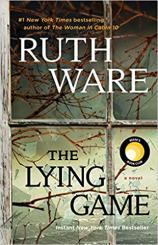Author Talk: July 28, 2017
Ruth Ware follows up her New York Times bestsellers IN A DARK, DARK WOOD and THE WOMAN IN CABIN 10 with her third psychological thriller, THE LYING GAME. Three women receive a text from the fourth member of their former clique that reads, simply, “I need you” --- and they fear their lives will never be the same. In this interview, Ware explains what compelled her to write this chilling, twisty novel; her inspiration for Salten, the boarding school that the four main characters attended and where the infamous Lying Game originated; and the difficulties of switching between time periods during the writing process. She also reveals her favorite scenes from THE LYING GAME, offers advice for aspiring writers, and talks about the most rewarding part of publishing a book.
Question: Both of your previous novels have been New York Times bestsellers. Given the success of your earlier books, did you feel any added pressure when writing THE LYING GAME? If so, how did you deal with it while you were writing?
Ruth Ware: I found the success of IN A DARK, DARK WOOD really distracting when I was writing THE WOMAN IN CABIN 10, but in a way the fact that CABIN 10 was doing well felt quite freeing while I was writing THE LYING GAME. I suppose my biggest worry was proving a “one-hit wonder.” The fact that CABIN 10 was giving WOOD a run for its money made me feel like I was (hopefully) not just going to be a flash in the pan as a writer.
Q: As a New York Times bestselling novelist, do you have any advice for aspiring writers? Is there anything that you wish you had known when you first began your career as a professional writer?
RW: Oh, I wish there was a magic fix or some piece of advice that would smooth everything out --- I’d bottle it and make a fortune! The only advice I can give to aspiring writers is to write the book that you would want to read, and hope other people agree. As for the publishing side, I guess one can do worse than follow the advice Rudyard Kipling gave in his poem “If,” particularly meeting with triumph and disaster just the same (which I interpret as good and bad reviews!).
Q: You describe Salten and the girls’ experiences there so vividly. Was Salten based on a real place? How did you come up with it?
RW: The landscape around Salten is sort of loosely based on Romney Marsh on the south coast, which is eerily beautiful and very isolated. But the Tide Mill is based on one I drove past one misty morning in northern France, in Brittany. It’s near a place called Saint-Suliac. The place I saw is definitely not habitable --- it was quite clearly dilapidated beyond repair --- but I was completely entranced by the landscape: the bleak, wide salt marshes, the bleached blue skies, and this black crumbling hulk slowly disappearing into the sea. I knew there and then I would end up putting it into a book.
Q: THE LYING GAME is intricately plotted and filled with unexpected twists. When you began writing, did you know how the story would end?
RW: I had the bones of the story in place from the outset, and the final cataclysmic scene at the Mill was in my mind from the beginning. But the exact twists and turns (including who was responsible for some of the creepier happenings) only revealed themselves in the writing.
Q: There are so many memorable scenes in THE LYING GAME, from Isa’s train ride down to Salten where she meets Kate and Thea to the girls’ weekends at the Tide Mill. What were your favorite scenes to write? Why?
RW: Ooh…hard question! Possibly my favorite was the scene where Isa meets Mary Wren at the post office for the first time. I love writing a scene with a good measure of conflict. But I also love the scenes where all the women are together, figuring stuff out. I really enjoy writing about female friendship. It’s an endlessly interesting dynamic for me.
Q: In THE LYING GAME, the action alternates between the past when the girls were in school at Salten and present day. Was it difficult to switch between time periods while you were writing? Can you tell us about your writing process?
RW: I write as if I’m someone reading the book. Often people ask if I write one strand first, and then go back and seed in the other, but I don’t think I could keep track of who knows what, and the tension would come out wrong, so the answer is no. I write it more or less in the order you read it. (The more or less part being because sometimes my editors will ask me to go back and add an extra scene here or there.) I didn’t find it hard at all to switch back and forth; it felt very natural because the present strand is in the present tense, and the past strand is all linked to Isa’s memories. It did make it hard to edit, however. Normally you can move scenes around if you need to, to preserve a reveal for later in the book, or prolong the tension for some reason. But because all the past scenes are triggered by Isa’s memories --- often by specific things that happen in the present-day narrative --- it meant that it was really hard to change things.
Q: Kirkus Reviews, Bustle and Metro have all compared your writing to Agatha Christie’s. Were you influenced by Christie’s novels? Are there any other authors who have inspired you? Who are they?
RW: I love Christie. I read her a huge amount as a teen, and I still think there’s little more satisfying than curling up in front of the fire with a sumptuous Christie adaptation on the TV! But for this book, I think I was maybe more influenced by all the boarding school stories I read as a child. There’s maybe a bit of THE SECRET HISTORY in there, too.
Q: Is there anything that has been particularly rewarding about publishing THE LYING GAME? If so, what?
RW: Well, as I’m writing this, it hasn’t yet come out --- so I’m still waiting for the most rewarding part, which is talking to readers and finding out what they made of my characters.
Q: What would you like your readers to take away from THE LYING GAME? What compelled you to write it?
RW: I’m quite resistant to telling people what they are supposed to find in a book. I don't like it as a reader, and so I try not to tell people how they should react, although I’m always interested in the different things people pick up on. But I suppose what compelled me to write it was thinking about the priorities in our lives and how our loyalties shift throughout our lifetimes --- how we go from being small children, completely focused on our parents, to teens wrapped up in our friends, to love affairs, and then finally we become parents ourselves and that focus moves to our own children, and we would sacrifice almost anything to keep them safe. I’m not sure if I realized that that’s what I was writing about until I’d finished, though!
Q: Are you working on anything now? Can you tell us about it?
RW: I’m about to start my fourth book! It’s way too early to say very much about it, because I’m not sure if I’ve figured it out myself yet, but I think it might feature a bequest.




